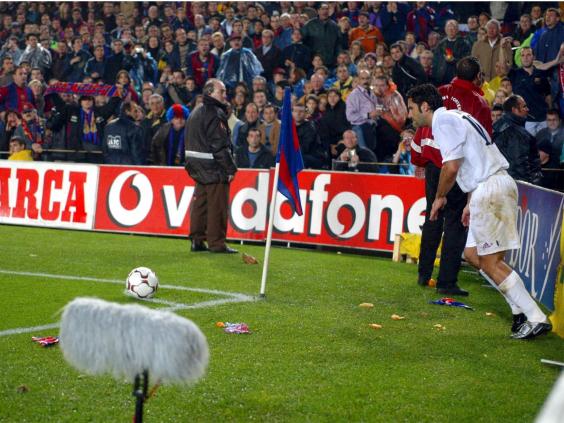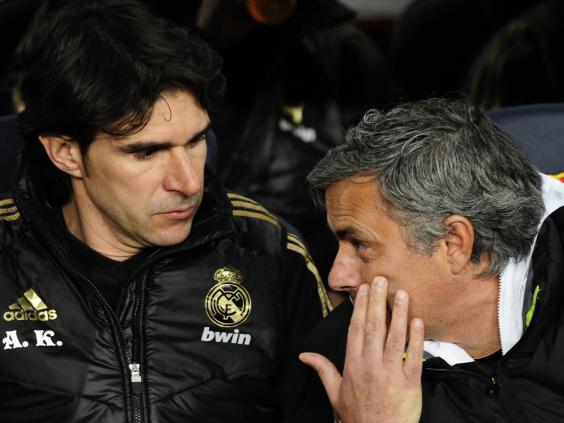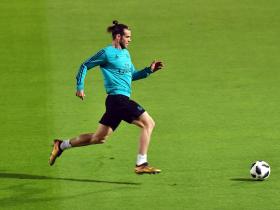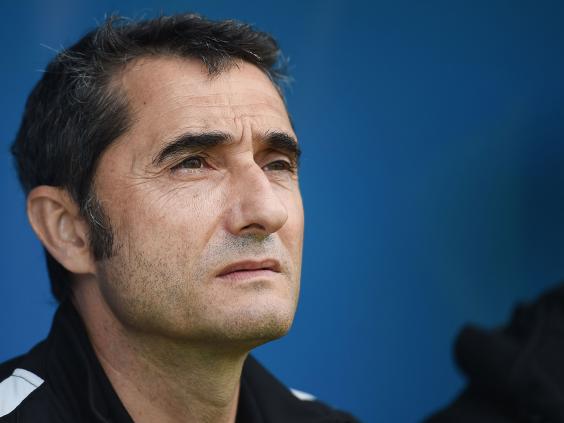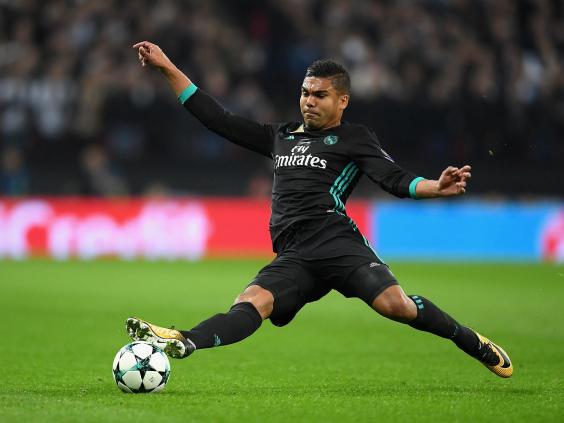For a coach, one of the many things that makes the clásico a fixture different in scale to virtually any other club game is that you start preparing for the next one from the moment the last one has finished. That’s how consuming it is. You have questions about what you could have done differently, start scrutinising what the opposition did differently, down to the very finest details. There’s naturally so much second-guessing, as you think of how to respond to what happened, but also offer something new the next time. I recognise it so well from my time working with Jose Mourinho at Real Madrid, up against Pep Guardiola’s Barcelona.
Yet, as intense as that spell between 2010 and 2012 was for so many people, the fixture at Camp Nou on 21 October 2000 was still on another level. That was of course when Luis Figo returned to Barcelona for the first time as a Real Madrid player. I was in the Real starting XI that night as a centre-half, and was never in another game like it.
It’s the most obvious answer to such questions for a reason. With every clásico, you are conscious that the eyes of the world are on you and that brings extra levels of awareness, but this just had an extra level of everything. The tension.
There’s of course something extra to every clásico. This weekend, there’s been the debate about whether Barcelona should give Real the guard of honour for winning the Club World Cup. As a player, when you have do it, you hate it, but when you go out through one you love it and realise why it’s required! It’s just one of those things, though, and really pales next to what actually happens on the pitch within those 90 minutes.
I have to say that, having experienced the clásico for five years as a Real player between 1997 and 2002 and then three years as a coach between 2010 and 2013, the tension and pressure is much, much greater if you’re on the technical staff.
When you’re a player, you just have your own job and concentrate on that. When you’re a coach, there’s obviously so much more to think about, so it becomes something more.
That is another reason why it becomes so consuming, because all of the decisions you were involved in end up rippling out to the next one.
In that regard, it’s interesting how much has changed since the last clásico, and this is what I mean by how much it consumes the coaches. I know the two managers personally, having played with Zinedine Zidane for a season at Real Madrid after he joined for a world record in 2001, while Ernesto Valverde was both by teammate and boss at Athletic Bilbao.
Valverde really has had some response since that 5-1 aggregate defeat in the Super Cup back at the start of that season. At that point, and given everything that had happened at Barca in the summer, there were so many people saying his time was over before it had even begun. It hasn’t turned out like that.
As his friend, I’m happy for him, even if he is doing well with my old team’s eternal rival!
He has handled the club’s ongoing change of style - something that has been happening for over two years - brilliantly. Most importantly, he’s kept his own focus and just kept working, thereby giving this Barca more focus. That is really to his credit. He has adapted so well to the profile of the players he has been given, and in turn given them a playing style that fully suits them.
With Real, it’s different, as they go into this game 11 points behind a side they beat by four goals at the start of the season. They just haven’t looked themselves, and not been scoring as much. I do think much of that is just down to a natural human plateauing after winning so much, and especially after becoming the first club side to win two successive Champions Leagues in a row in the modern format. Not even Guardiola’s Barca could do that, after the sensation of winning six trophies in a calendar year.
That’s because, and you could see in the three Champions League-winning Real sides I played in, there’s just a subconscious drop in intensity and concentration. You obviously don’t want it, and are conscious of it, but it’s also something that’s difficult to arrest. There’s also the other side that opposition raise it against you.
There’s still a long way to go in the season, though, and this squad is still good enough to go challenging for everything again.
The core of that squad is one thing has made the dynamic of the fixture different to when I was there with Jose and we would look to do damage on the counter. With the three players in the middle - Luka Modric, Toni Kroos and Isco - Real are now much more of a possession team, whereas Barca are less of a possession team than they used to be. That has meant Cristiano Ronaldo is so much more central, whereas he used to be coming in off the wing with us.
Given the make-up of the team, the key to this game will be transitions; what you do the moment you recover the ball.
Real will also have to deal with Leo Messi, who is on such good form, even for him.
It’s so difficult to come up with any kind of plan to stop him but, in our last few matches at Real with Jose, I think we achieved it. Half of it is actually not to absolutely obsess about him, especially when he drops back to receive the ball out of his main zone of influence. You have to be disciplined enough not have players going loco chasing him all over the pitch and disrupting the system, and instead focus on when you go for him at key points - like when he he appears in the second line. You also have to try and condition the game so he spends more time in positions he isn’t as comfortable in.
Casemiro can be key in this, as I think he is one of the most important players Real have. He is everywhere.
They will require that kind of energy.
They also badly require a win - but that is why I think Real will do so. This a team has thrived under pressure over the past two years, and now faces huge pressure in this game. That can restore their urgency, whereas Barca don’t have the same need to win.
That, combined with home advantage, could be enough for Real.
A win won’t be enough for either technical staff, though. There will still be so much more to dwell on. That is what makes this game unique.
- More about:
- Real Madrid
- Fc Barcelona
- Aitor Karanka


